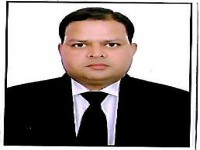Free Legal Advice from Top Lawyers in India
Question : A Compliant of 156(3) was filed by my mother- I was summoned by the court for an offence U/s 506 IPC. During the pendency of trial complaint died before framing of charge. Accused could not get the opportunity to cross-examine the complainant. However, evidence of CW1 i.e the son of the complainant were recorded and cross-examined, what he deposed was only hearsay. What could be the fate of the case? Does Section 244/245 will apply in the present matter? Can accuse demand discharge for not getting opportunity of cross examine of the material witness. Pls advice otherwise what relief may be for the accused.
Subject : Fate of a Complaint Case filed under 156(3) for an offence of 506 IPC.
Answer By Lawyer : contact me on 7599486095

M/s. LEGAL TYCOON
New Delhi G.P.O. , New Delhi
Question : A Compliant of 156(3) was filed by my mother- I was summoned by the court for an offence U/s 506 IPC. During the pendency of trial complaint died before framing of charge. Accused could not get the opportunity to cross-examine the complainant. However, evidence of CW1 i.e the son of the complainant were recorded and cross-examined, what he deposed was only hearsay. What could be the fate of the case? Does Section 244/245 will apply in the present matter? Can accuse demand discharge for not getting opportunity of cross examine of the material witness. Pls advice otherwise what relief may be for the accused.
Subject : Fate of a Complaint Case filed under 156(3) for an offence of 506 IPC.
Answer By Lawyer : KINDLY CALL ON 02262373189 AND 08291730768

pandey and wagh associates (Advocates & Compa
Churchgate , Mumbai
Question : A Compliant of 156(3) was filed by my mother- I was summoned by the court for an offence U/s 506 IPC. During the pendency of trial complaint died before framing of charge. Accused could not get the opportunity to cross-examine the complainant. However, evidence of CW1 i.e the son of the complainant were recorded and cross-examined, what he deposed was only hearsay. What could be the fate of the case? Does Section 244/245 will apply in the present matter? Can accuse demand discharge for not getting opportunity of cross examine of the material witness. Pls advice otherwise what relief may be for the accused.
Subject : Fate of a Complaint Case filed under 156(3) for an offence of 506 IPC.
Answer By Lawyer : KINDLY CALL ON 02262373189 AND 08291730768

pandey and wagh associates (Advocates & Compa
Churchgate , Mumbai
Question : A Compliant of 156(3) was filed by my mother- I was summoned by the court for an offence U/s 506 IPC. During the pendency of trial complaint died before framing of charge. Accused could not get the opportunity to cross-examine the complainant. However, evidence of CW1 i.e the son of the complainant were recorded and cross-examined, what he deposed was only hearsay. What could be the fate of the case? Does Section 244/245 will apply in the present matter? Can accuse demand discharge for not getting opportunity of cross examine of the material witness. Pls advice otherwise what relief may be for the accused.
Subject : Fate of a Complaint Case filed under 156(3) for an offence of 506 IPC.
Answer By Lawyer : There may, of course, be cases, where, on the death of the complainant, the trial may not be allowed to proceed by the Magistrate if he finds that the personal appearance of the complainant is necessary. example, if a complaint is lodged by a complainant alleging that the accused has assaulted him, then, if the sole witness is the complainant himself and he dies, not because of the assault but for some other reason, no purpose would be served in continuing with such a complaint, for, the trial would eventually end with the acquittal of the accused on account of complete absence of evidence. But supposing that the complainant dies after his evidence has been recorded and he has been put to cross-examination too, then, the trial can still proceed, for, the personal appearance of the complainant would no longer be necessary. Let us, now, take yet another case. Supposing a complaint is lodged by a person alleging that his son had been assaulted by the accused. In course of time, the Magistrate issued summons in such a case and the accused appeared, but the complainant did not appear due to his death. The Magistrate should, in such a case, proceed with the trial, for, even in the absence of the complainant, the evidence of the complainant's son may result into conviction of the accused. It will, therefore, depend on the facts of a given case as to whether the case Shall be allowed to proceed even after the death of the complainant or not. No inflexible rule, in this regard, can be laid down. In other words, whether a complaint in a summons case be allowed to continue even after the death of the complainant is a question, which has to be answered on the basis of the facts of the given case and no invariable or inflexible rule of law can be laid down in this regard. The discretion to be exercised in such cases shall, however, be judicious and not arbitrary.
the offence under section 506 is non cognizable against which a complaint lies before the magistrate and the magistrate can't order investigation under section 156(3) crpc, in ur case the magistrate may discharge the accused.
